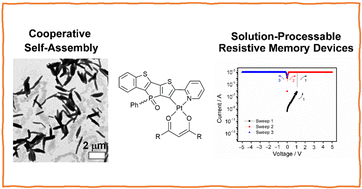A new class of neutral phosphole oxide-based cyclometalated platinum(II) β-diketonate complexes has been demonstrated to show cooperative self-assembly in THF–water mixtures, modulated by the directional Pt⋯Pt interactions along with π–π stacking and/or hydrophobic interactions. The phosphole oxide-based cyclometalating ligand has been found to play an important role in determining the morphologies of aggregates in THF–water mixtures. Moreover, platinum(II) complexes serving as active materials in resistive memory devices have been found to show promising binary memory performance with a low switching threshold voltage, long retention time and high ON/OFF ratio compared to devices based on reported organometallic complexes. The rich self-assembly and resistive memory properties of the complexes presented in the current work have illustrated the versatility of the robust platinum(II) complexes that could be utilized for the development of functional materials.
